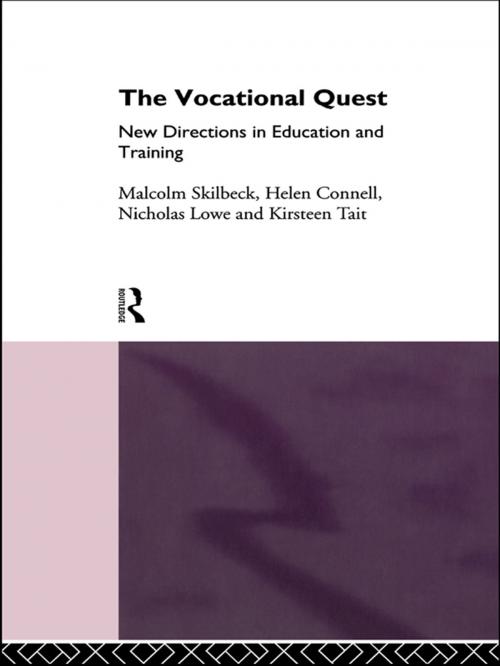The Vocational Quest
New Directions in Education and Training
Nonfiction, Reference & Language, Education & Teaching| Author: | Helen Connell, Nicholas Lowe, Malcolm Skilbeck, Kirsten Tait | ISBN: | 9781134838561 |
| Publisher: | Taylor and Francis | Publication: | February 7, 2002 |
| Imprint: | Routledge | Language: | English |
| Author: | Helen Connell, Nicholas Lowe, Malcolm Skilbeck, Kirsten Tait |
| ISBN: | 9781134838561 |
| Publisher: | Taylor and Francis |
| Publication: | February 7, 2002 |
| Imprint: | Routledge |
| Language: | English |
Government attempts in recent years to create a national system of vocational education and training have marked a profound shift both in educational policy and in underlying concepts of what education is for. Relations between schools and the working world are changing all the time and the implementation of ideas of vocationalism has forced a blurring of the time-honoured boundaries between educations concerned with concepts and training, or with skills. The challenge now is to define how the schools can give young people the foundations for life in a working world in which they are likely to have to change jobs and where work will fill a smaller proportion of their lives. The Vocational Quest maps the evolution of vocationalism in Britain in historical terms and examines how the particular forms that have come into being in the last few years compare with developments in other parts of the world, including Continental Europe, Japan, the United States, Australia and New Zealand. It argues for new forms of communication and partnership between formal education and training and the wider community, in which values will be shared and no one partner will win at the expense of others.
Government attempts in recent years to create a national system of vocational education and training have marked a profound shift both in educational policy and in underlying concepts of what education is for. Relations between schools and the working world are changing all the time and the implementation of ideas of vocationalism has forced a blurring of the time-honoured boundaries between educations concerned with concepts and training, or with skills. The challenge now is to define how the schools can give young people the foundations for life in a working world in which they are likely to have to change jobs and where work will fill a smaller proportion of their lives. The Vocational Quest maps the evolution of vocationalism in Britain in historical terms and examines how the particular forms that have come into being in the last few years compare with developments in other parts of the world, including Continental Europe, Japan, the United States, Australia and New Zealand. It argues for new forms of communication and partnership between formal education and training and the wider community, in which values will be shared and no one partner will win at the expense of others.















